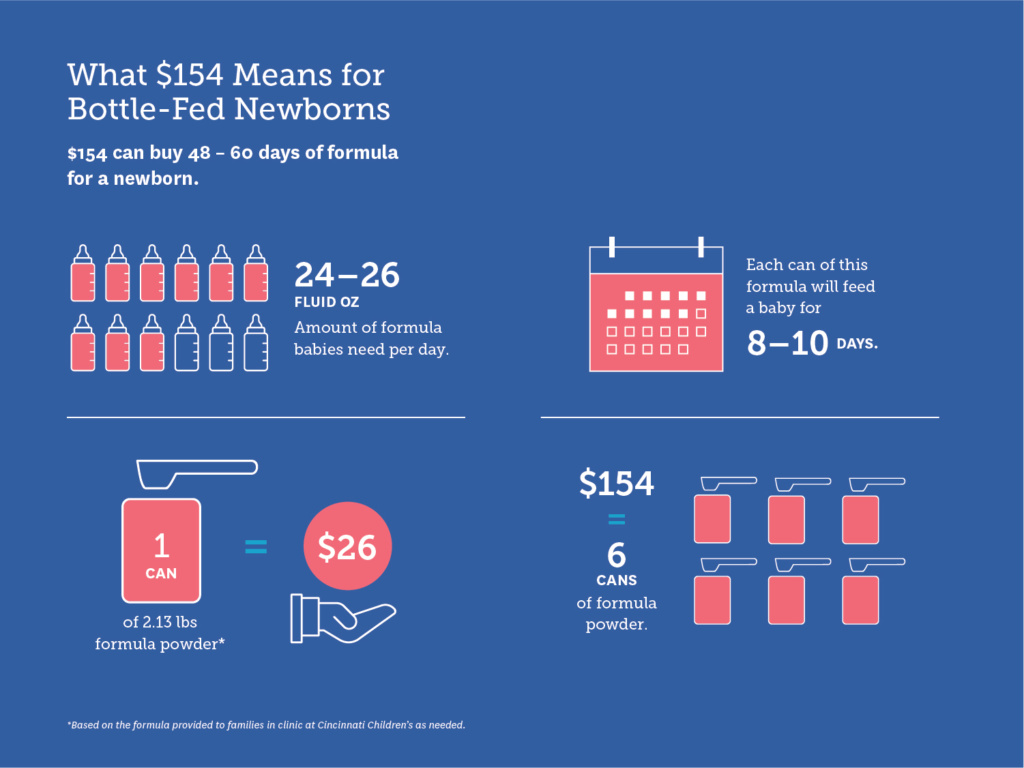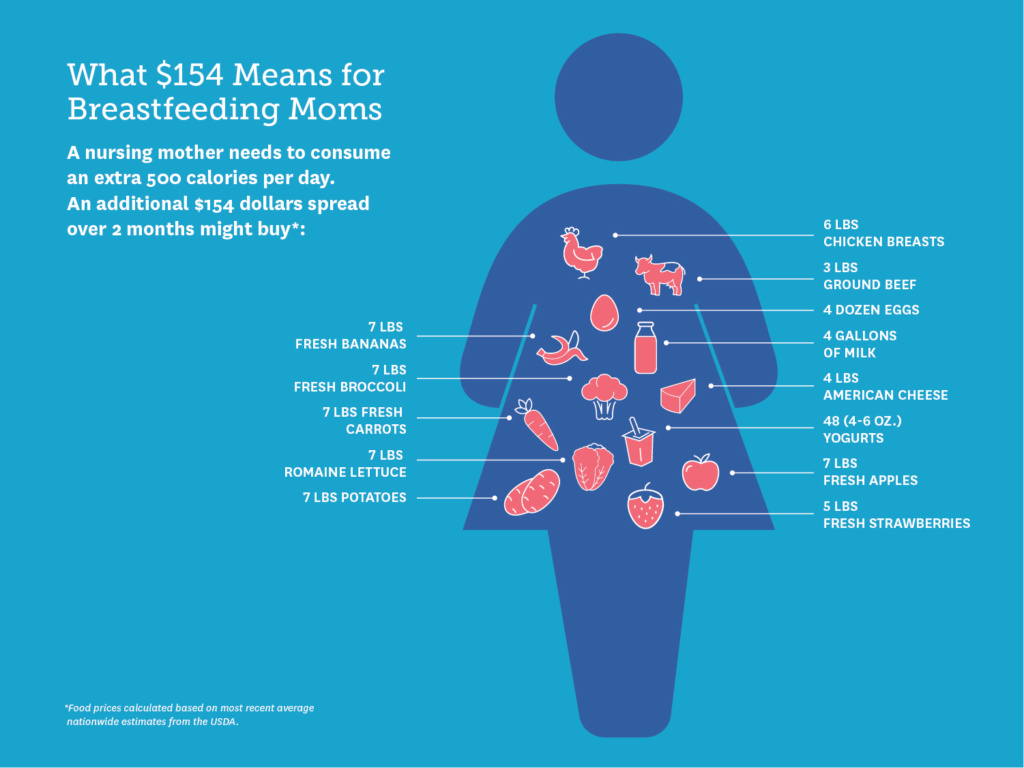When Javana Bradford took her one-month old daughter, Augyst, for a checkup at Cincinnati Children’s Hospital Medical Center, pediatrician Melissa Klein asked if she and her daughter were getting enough to eat. Ms. Bradford said she was having trouble adding Augyst to her Supplemental Nutrition Assistance Program (SNAP) benefits, commonly known as food stamps. Dr. Klein referred her to Deanna White, a paralegal at the hospital’s medical-legal partnership (MLP) with the Legal Aid Society of Greater Cincinnati.
 To add a newborn to a mother’s SNAP benefits in Hamilton County, Ohio, the mother must call the Department of Job & Family Services (JFS) or go on their website to report the birth. A caseworker will then send mom a “baby packet” to complete a
To add a newborn to a mother’s SNAP benefits in Hamilton County, Ohio, the mother must call the Department of Job & Family Services (JFS) or go on their website to report the birth. A caseworker will then send mom a “baby packet” to complete a
nd send back. Included in this packet is a new household verification form that mom’s landlord must sign to confirm that the child lives with her. She also has to send back proof that she has applied for a social security number for her child. “I’ve worked at Legal Aid for 12 years,” said Ms. White. “I can’t tell you how many times I’ve read in case worker notes that the baby wasn’t added to SNAP benefits because mom failed to return the new baby packet. It’s a very common barrier.”
Even if a mom does get all the forms signed and returned, mail is not always reliable at JFS; not all paperwork that is received gets scanned properly, sometimes causing further delays. And if a mom clears all these hurdles and everything is in order, her SNAP benefits won’t change until the month after the application is processed. So, a mom who reported the birth of a baby in mid-September may not get the baby packet returned until after October 1 and her benefits wouldn’t increase until November 1.
That delay means an average loss of $154 in benefits for a family, and the resulting loss in nutrition during that time can be devastating.

 “Having appropriate nutrition is critical throughout all stages of childhood,” said Dr. Klein, who is also an Associate Professor of Pediatrics at Cincinnati Children’s. “Proper nutrition may be the most critical during the first two years because that’s a period of accelerated brain growth. Food insecurity is associated with many poor outcomes including micronutrient deficiencies, developmental and behavioral issues, increased rates of acute infections, hospitalizations, and complications due to chronic illnesses. In addition, when a mom cannot afford enough food, she will often attempt to spare the baby by eating less herself. This is especially an issue among breast feeding mothers who need an extra 500 calories a day. Thus, if the mom is not eating enough, it is not good for mom or baby.”
“Having appropriate nutrition is critical throughout all stages of childhood,” said Dr. Klein, who is also an Associate Professor of Pediatrics at Cincinnati Children’s. “Proper nutrition may be the most critical during the first two years because that’s a period of accelerated brain growth. Food insecurity is associated with many poor outcomes including micronutrient deficiencies, developmental and behavioral issues, increased rates of acute infections, hospitalizations, and complications due to chronic illnesses. In addition, when a mom cannot afford enough food, she will often attempt to spare the baby by eating less herself. This is especially an issue among breast feeding mothers who need an extra 500 calories a day. Thus, if the mom is not eating enough, it is not good for mom or baby.”
After receiving Ms. Bradford’s referral, Legal Aid Society of Greater Cincinnati did some research and discovered three important things. One, the burdensome paperwork that was giving moms so much trouble wasn’t required — all JFS legally needed to process and increase SNAP benefits was a medical record to verify the child’s birth. Two, the delay in benefits post-application was technically legal, but JFS was waiting until the last moment allowable to make the increases; they could do it sooner. Third, and perhaps most significant, Ms. White learned that Medicaid Managed Care providers notify JFS — which also administers Medicaid in the county — weekly of all newborns born to mothers on Medicaid, and those babies are automatically enrolled in Medicaid. These same providers were not asking about SNAP, and the birth records sent to JFS were not being connected to SNAP records.
The MLP team raised these concerns with JFS, which then agreed to work with them to change the application requirements and processing procedure. Beginning in June 2016, JFS got rid of the baby packet. Instead, every day dedicated JFS staff now take the birth reports they receive from Medicaid Managed Care providers and automatically run a check to see if any of the moms also receive SNAP. For anyone who does, her newborn is automatically added to her household; mom doesn’t have to do anything. And since anyone who receives SNAP benefits is eligible for Medicaid, and most of those moms are already enrolled in Medicaid to cover prenatal and child birth expenses, this procedural change will catch most SNAP households with a newborn. JFS has taken the fix a step further and built a mechanism for Medicaid Managed Care providers to enter birth information directly into JFS’ computer system, eliminating another administrative step, and enrolling babies in Medicaid, SNAP, and cash assistance even faster. “This will impact people who would not ever have been referred to us,” said Ms. White. “We tell health care providers to refer families if their food benefits had been denied or suddenly reduced without explanation. Here, the delay moms were experiencing, and the burden of the application packet itself, weren’t traditional legal problems, but nonetheless they were a big reason why many children were never added to their mothers’ accounts or were missing months of critical benefits.”
The MLP does not have data on the number of babies born per month in Hamilton Country who are eligible for Medicaid or SNAP. However, the two primary care clinics in Hamilton County that the MLP serves, see about 180 newborns a month. From serial surveying, the hospital knows that one-third of these families are food insecure and ninety percent are on Medicaid. So among the patients seen at the hospital-owned outpatient primary care centers, these changes are expected to help approximately 150 families per month enroll in and receive SNAP benefits faster, getting their infants the food needed in their first few months.
The elimination of these administrative burdens didn’t just benefit families; the elimination of the “new baby packet” also resulted in cost savings and efficiency improvement for JFS. And this whole process has changed how doctors at Cincinnati Children’s screen families.
“Before, I didn’t know anything about SNAP benefits or when they are implemented,” said Dr. Klein. “From working with our MLP, my counseling has changed. Now I ask all moms with newborns about their SNAP benefits and whether the baby has been added to their case. Since we are a teaching site, this knowledge has been shared with many resident and attending providers, leading to more widespread practice change and greater advocacy for our patients and families.”
This is really important, especially since inquiring about SNAP during a routine checkup is how this all got started.
“After this advocacy was over, I called Ms. Bradford, who had waited months for her daughter to receive food benefits,” said Ms. White. “We hadn’t been able to help her — this change wasn’t retroactive to the families impacted by the old policy — and by that time, she was back to work. But I told her about what the changes meant for other families, and that she was really the genesis of all of it. I told her how much I appreciated working with her, and that I would always think of the rule as her Augyst’s rule. She was just so proud.”
“I’m so happy. I really am,” said Ms. Bradford. “Any other time before that visit with Dr. Klein, I probably would have been too embarrassed to even admit during a routine check-up that I was hungry and not receiving enough food. But I was nursing at the time, and I was really afraid that I would start to have a milk shortage if I didn’t get help fast. I did end up having to supplement, but the moms this may help in the future is tremendous.”
Story by Kate Marple & Erin Dexter
Click here to download a PDF of the story.
